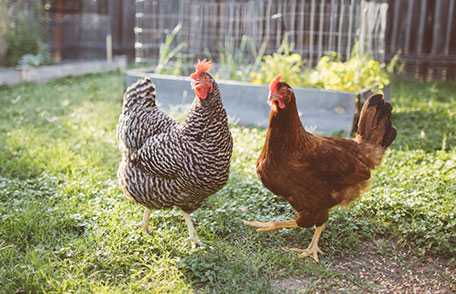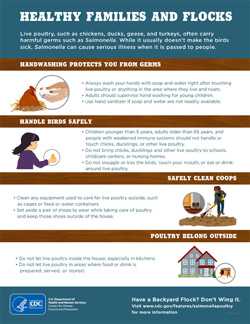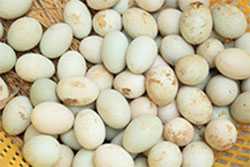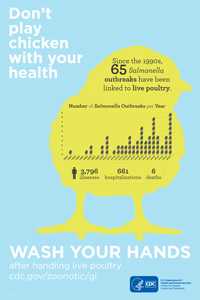Keeping Backyard Poultry
ALERT: Multistate Outbreaks of Human Salmonella Infections linked to Live Poultry
CDC, USDA, and several states are investigating multiple outbreaks of human Salmonella infections linked to live poultry in backyard flocks. These outbreaks are a reminder to always wash hands thoroughly with soap and water right after touching live poultry.

Live poultry, such as chickens, ducks, geese, and turkeys, often carry germs such as Salmonella. After you touch a bird, or anything in the area where birds live and roam, wash your hands so you don’t get sick!
Owning backyard chickens and other poultry can be a great experience. However, children and other groups of people have a greater chance of illness from handling live poultry or anything in the area where they live and roam. Even handling baby birds displayed at stores can cause a Salmonella infection. Keep reading to learn about the steps you can take to stay healthy around live poultry.
How do people get Salmonella infections from live poultry?
Live poultry might have Salmonella germs in their droppings and on their bodies (feathers, feet, and beaks), even when they appear healthy and clean. The germs can get on cages, coops, feed and water dishes, hay, plants, and soil in the area where the birds live and roam. Germs also can get on the hands, shoes, and clothes of people who handle or care for the birds.
Animals and Health
Check out two CDC websites with helpful resources.
Zoonotic Diseases (Diseases from Animals): Information about outbreaks from animals, prevention messages, and helpful resources.
Healthy Pets Healthy People: Information on the health benefits of pets and disease risks.
People become infected with Salmonella germs when they put their hands or equipment that has been in contact with live poultry in or around their mouth. Young children are more likely to get sick because their immune systems are still developing and they are more likely to put their fingers or pacifiers and other items into their mouths. Some people who have contact with items, like coops or water dishes, in the area where poultry live can get sick without actually touching one of the birds. Germs on your hands can spread easily to other people or surfaces, which is why it’s important to wash hands immediately with soap and water after touching poultry or anything in the area where they live and roam.

View this poster [631 KB]
and other resources.
How do I reduce the chance of Salmonella infection?
- Always wash your hands with soap and water right after touching live poultry or anything in the area where they live and roam.
- Adults should supervise handwashing by young children.
- Use hand sanitizer if soap and water are not readily available.
- Don’t let live poultry inside the house, especially in areas where food or drink is prepared, served, or stored.
- Set aside a pair of shoes to wear while taking care of poultry and keep those shoes outside of the house.
- Don’t let children younger than 5 years, adults older than 65, or people with weakened immune systems from conditions such as cancer treatment, HIV/AIDS or organ transplants, handle or touch chicks, ducklings, or other live poultry.
- Don’t eat or drink in the area where the birds live or roam.
- Avoid kissing your birds or snuggling them, then touching your mouth.
- Stay outdoors when cleaning any equipment or materials used to raise or care for live poultry, such as cages or feed or water containers.
- Buy birds from hatcheries that participate in the U.S. Department of Agriculture National Poultry Improvement Plan (USDA-NPIP) U.S. voluntary Salmonella Monitoring Program [279 KB]. This program is intended to reduce the incidence of Salmonella in baby poultry in the hatchery, which helps prevent the spread of illness among poultry and people.

Poultry may carry bacteria such as Salmonella that can contaminate the inside of eggs before the shells are formed. Eggs can also become contaminated from the droppings of poultry.
Safe Handling Tips for Eggs from Backyard Poultry
Shell eggs may become contaminated with Salmonella through the laying process, once the eggs are laid, through poultry feed or bedding.
To keep your family healthy, follow the tips below when collecting and handling eggs from a backyard flock:
- Always wash your hands with soap and water after handling eggs, chickens, or anything in their environment.
- Maintain a clean coop. Cleaning the coop, floor, nests and perches on a regular basis will help to keep eggs clean.
- Collect eggs often. Eggs that spend a significant amount of time in the nest can become dirty or break. Cracked eggs should be thrown away.
- Eggs with dirt and debris can be cleaned with fine sandpaper, a brush or cloth. Don’t wash eggs, because colder water can pull bacteria into the egg.
- Refrigerate eggs after collection.
- Cook eggs thoroughly. Raw and undercooked eggs contain Salmonella bacteria that can make you sick.
- Know the local regulations around sale of eggs. If you sell eggs, it is important to follow local licensing requirements.
Learn more about Salmonella and Eggs.
What are the signs and symptoms of Salmonella infection?
Salmonella germs can make people sick with:
- Diarrhea
- Vomiting
- Fever
- Abdominal cramps
Live poultry also can carry avian influenza (flu) viruses. Avian flu very rarely makes people sick. Learn more about avian flu and steps you can take to protect yourself.
Sometimes, people can become so sick from a Salmonella infection that they have to go to the hospital. Children younger than 5 years, adults older than 65, and people with weakened immune systems, including pregnant women, are more likely to have a serious illness from Salmonella.
CDC’s Salmonella website has more information about Salmonella infections. If you suspect you or your child has a Salmonella infection, please contact your healthcare provider immediately.
What are the rules for owning live poultry?
Rules and regulations vary by city, county, and state, so check with your local government to know the rules for where you live.
More Information
- Healthy Pets Healthy People: Backyard Poultry
- Live Animal and Live Bird Markets: Stay Healthy and Safe from Germs
- Disease Detectives at Work—Detecting Salmonella Infections from Backyard Flocks
- United States Department of Agriculture’s Biosecurity for Birds (keeping your birds healthy)
- Avian Influenza A Virus Infections in Humans
Posters and Infographics:
- Healthy Families and Flocks [632 KB]
- How Infected Backyard Poultry Could Spread Bird Flu to People [555 KB]
- Wash Hands When Leaving Animal Exhibits Poster [681 KB]
Podcasts:
- CDC Kidtastics Podcast: Wash Your Hands [0:51 seconds]
- CDC Cup of Health: Cute But Risky
- CDC Radio: Hand Washing PSA [00:29 seconds]
Selected Publications:
- Outbreaks of Human Salmonella Infections Associated with Live Poultry, United States, 1990-2014
- Multistate Outbreak of Human Salmonella Infections Linked to Live Poultry from a Mail-Order Hatchery in Ohio — February–October 2014
- Compendium of Measures to Prevent Disease Associated with Animals in Public Settings, 2013 [495 KB]
- Page last reviewed: August 23, 2017
- Page last updated: August 23, 2017
- Content source:
- National Center for Emerging and Zoonotic Infectious Diseases, Division of Foodborne, Waterborne, and Environmental Diseases
- Page maintained by: Office of the Associate Director for Communication, Digital Media Branch, Division of Public Affairs




 ShareCompartir
ShareCompartir
